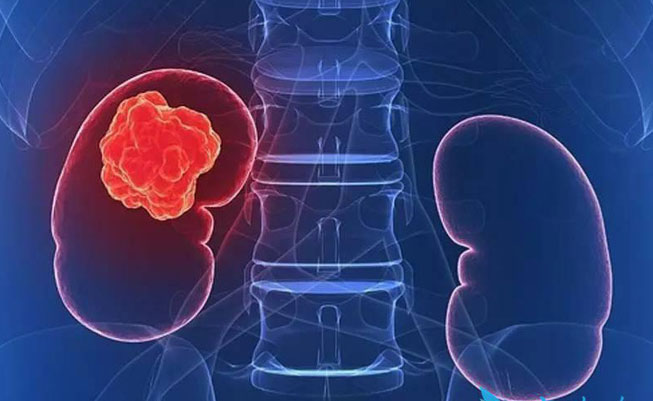Kidney Cancer is the 9th most common cancer in adults and ranks 3rd among urinary system cancers (after prostate and bladder cancer), yet it has the highest mortality rate.
What You Need to Know About Kidney Cancer
This disease is more common in men, with a male-to-female ratio of 2:1. The most affected age group is between 60-70 years old. Kidney cancer is very rare in patients under 50 years of age.
However, there are cases of kidney cancer in children, which accounts for 5% of cancer cases in young children. The most common age group is 3-4 years old, with about 1-2% having a familial (hereditary) nature. Kidney cancer in children often accompanies various congenital anomalies, such as urinary tract defects, aniridia, or hemihypertrophy.

Kidney cancer is very rare in patients under 50 years of age.
Causes of Kidney Cancer
The exact causes of kidney cancer are not well understood.
Some risk factors for kidney cancer include:
- Smoking: Smoking doubles the risk of developing kidney cancer.
- Exposure to harmful chemicals: Workers exposed to chemicals such as aniline dyes or heavy metals have a higher risk of kidney cancer.
- Obesity: Obese individuals have a higher risk of kidney cancer.
- End-stage kidney disease with dialysis.
- Prolonged use of pain relievers such as Paracetamol or NSAIDs (e.g., Ibuprofen, Aspirin).
- Hereditary kidney cancer: accounts for less than 5% of all kidney cancer patients. Some syndromes that may lead to kidney cancer include von Hippel-Lindau syndrome, Birt-Hogg-Dube syndrome, or tuberous sclerosis.
Symptoms of Kidney Cancer
The symptoms of kidney cancer are characterized by a classic triad: hematuria, flank mass, and pain.
- Hematuria: Urine may appear pink, brown, or slightly discolored. If the blood is minimal, it may not be visible to the naked eye but can be detected through urinalysis.
- Flank pain: Pain typically originates from one side of the rib cage and lower back. It can be dull, persistent, and prolonged, with some cases experiencing severe pain.
- Abdominal mass: Patients may be able to feel a mass in their abdomen. However, most kidney tumors are deep within the abdominal cavity and difficult to palpate, often only detectable through imaging techniques such as ultrasound or CT scans.
Additionally, there are some non-specific symptoms:
- Fatigue, anemia
- Unexplained sudden weight loss
- Fever
Stages of Kidney Cancer: Kidney cancer has 4 stages.
- Stage 1 Kidney Cancer: The tumor is still within the kidney, with no typical clinical signs. Patients may have microscopic hematuria (not visible to the naked eye, detectable only through testing), but the tumor is difficult to palpate clinically.
- Stage 2 Kidney Cancer: The tumor begins to grow but remains confined to the kidney. Patients start to exhibit symptoms.
- Stage 3 Kidney Cancer: The cancer has invaded surrounding areas such as perinephric tissue, the adrenal gland, and major veins.
- Stage 4 Kidney Cancer: The cancer has metastasized to other parts of the body, and the patient gradually becomes fatigued and emaciated.
At-Risk Groups for Kidney Cancer
Kidney cancer is not a common type of cancer. Some at-risk groups for kidney cancer include:
- Men who have smoked for many years
- Obese individuals
- People working in environments with hazardous industrial chemicals and heavy metals.
- Individuals using pain relievers for extended periods.
- Those with family members who have had kidney cancer, especially children with kidney cancer.
Prevention of Kidney Cancer
As the exact causes of kidney cancer are not yet identified, specific preventive measures are not available.
However, some general measures include:
- Do not smoke
- Minimize the use of stimulants
- Engage in regular physical exercise
- Ensure proper occupational safety measures
- It is important to have annual health check-ups.
Diagnostic Measures for Kidney Cancer
Diagnosing kidney cancer is based on clinical symptoms and paraclinical tests.
Tests for diagnosing kidney cancer include:
- Urinalysis: A complete urinalysis helps detect blood in the urine.
- Abdominal CT scan: A CT scan with contrast helps evaluate the characteristics of kidney cancer: location, number, size, surrounding invasion, and distant metastasis.
- Kidney biopsy or fine-needle aspiration: A tissue sample from the suspected kidney is taken using specialized tools and sent for cytological or pathological examination.
- Chest X-ray: Detects lung metastasis.
- Bone scan: Detects bone metastasis.
Treatment Options for Kidney Cancer
Treatment for kidney cancer is based on the stage of the disease.
Early-stage kidney cancer (Stages 1 and 2):
- Surgery: Depending on the nature of the tumor, partial or total nephrectomy may be indicated, with or without adrenalectomy.
- Minimally invasive thermal ablation techniques may be used to destroy the tumor.
Stage 3 Kidney Cancer:
- Resection of the renal tumor along with adjuvant systemic therapy.
- Resection of distant metastatic tumors (if possible) to improve clinical symptoms.
Stage 4 Kidney Cancer:
- Surgical treatment to relieve compression if present.
- Palliative radiation therapy, anti-compressive radiation therapy.
- Pain management.
- Targeted therapy and immunotherapy.
Detecting Genes Causing Kidney Cancer in Children

















































